Mutual Duty of Trust and Confidence in Employment Contracts
VerifiedAdded on 2023/06/13
|11
|2997
|86
AI Summary
This discussion is focused on highlighting the need for the mutual duty of trust and confidence, as has now been discontinued, to be recognized, but only in context of the employers being required to treat employees with proper respect. The employment contract is a contract, which covers the terms and conditions which set out employment of the employee and also governs the relationship between the employer and the employee. The employment contracts often cover terms which are implied, as they are not stated in an explicit manner. Despite the level of details put in the employment contract, some terms continue to be implied. This is the reason for the implied terms to be present and to be continued in the employment contracts.
Contribute Materials
Your contribution can guide someone’s learning journey. Share your
documents today.
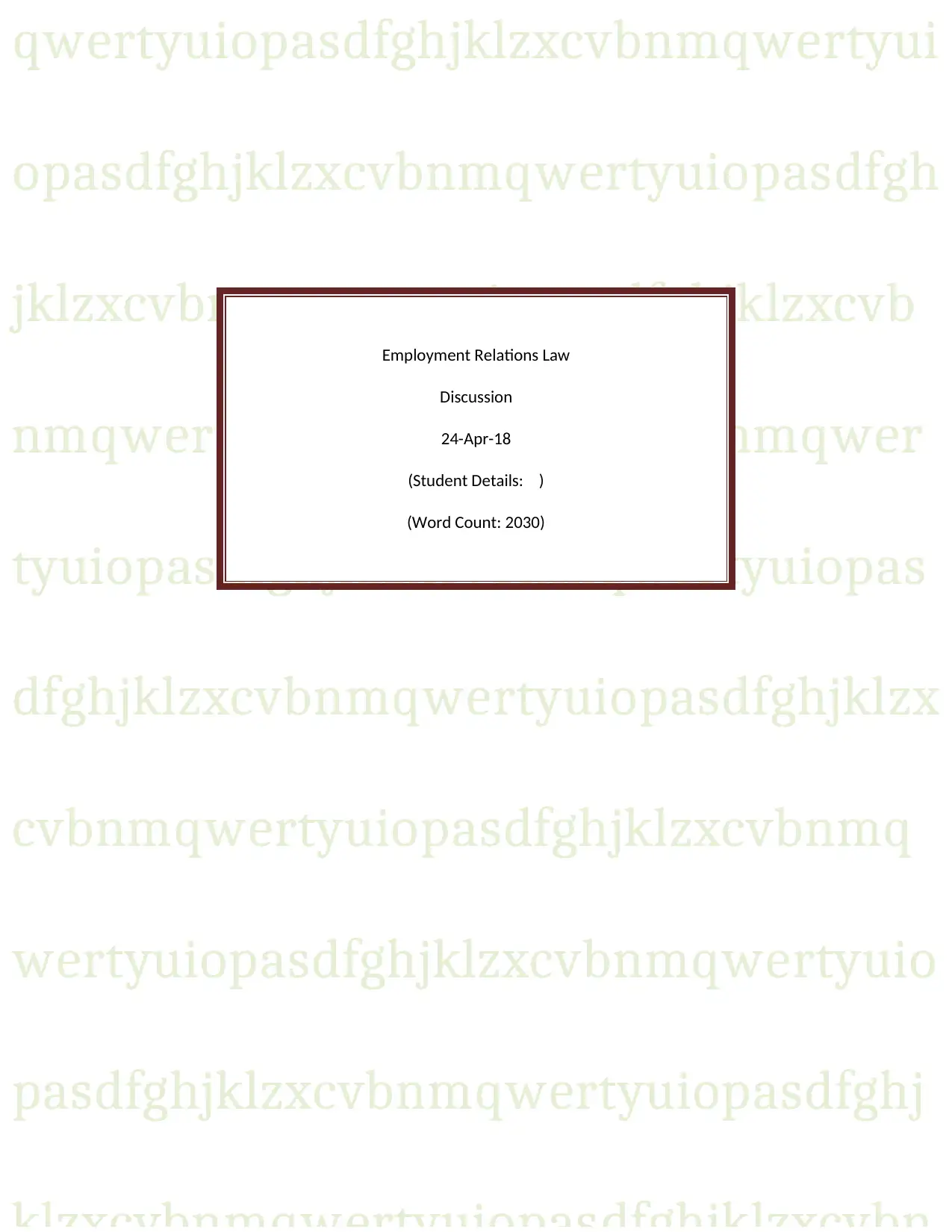
qwertyuiopasdfghjklzxcvbnmqwertyui
opasdfghjklzxcvbnmqwertyuiopasdfgh
jklzxcvbnmqwertyuiopasdfghjklzxcvb
nmqwertyuiopasdfghjklzxcvbnmqwer
tyuiopasdfghjklzxcvbnmqwertyuiopas
dfghjklzxcvbnmqwertyuiopasdfghjklzx
cvbnmqwertyuiopasdfghjklzxcvbnmq
wertyuiopasdfghjklzxcvbnmqwertyuio
pasdfghjklzxcvbnmqwertyuiopasdfghj
Employment Relations Law
Discussion
24-Apr-18
(Student Details: )
(Word Count: 2030)
opasdfghjklzxcvbnmqwertyuiopasdfgh
jklzxcvbnmqwertyuiopasdfghjklzxcvb
nmqwertyuiopasdfghjklzxcvbnmqwer
tyuiopasdfghjklzxcvbnmqwertyuiopas
dfghjklzxcvbnmqwertyuiopasdfghjklzx
cvbnmqwertyuiopasdfghjklzxcvbnmq
wertyuiopasdfghjklzxcvbnmqwertyuio
pasdfghjklzxcvbnmqwertyuiopasdfghj
Employment Relations Law
Discussion
24-Apr-18
(Student Details: )
(Word Count: 2030)
Secure Best Marks with AI Grader
Need help grading? Try our AI Grader for instant feedback on your assignments.
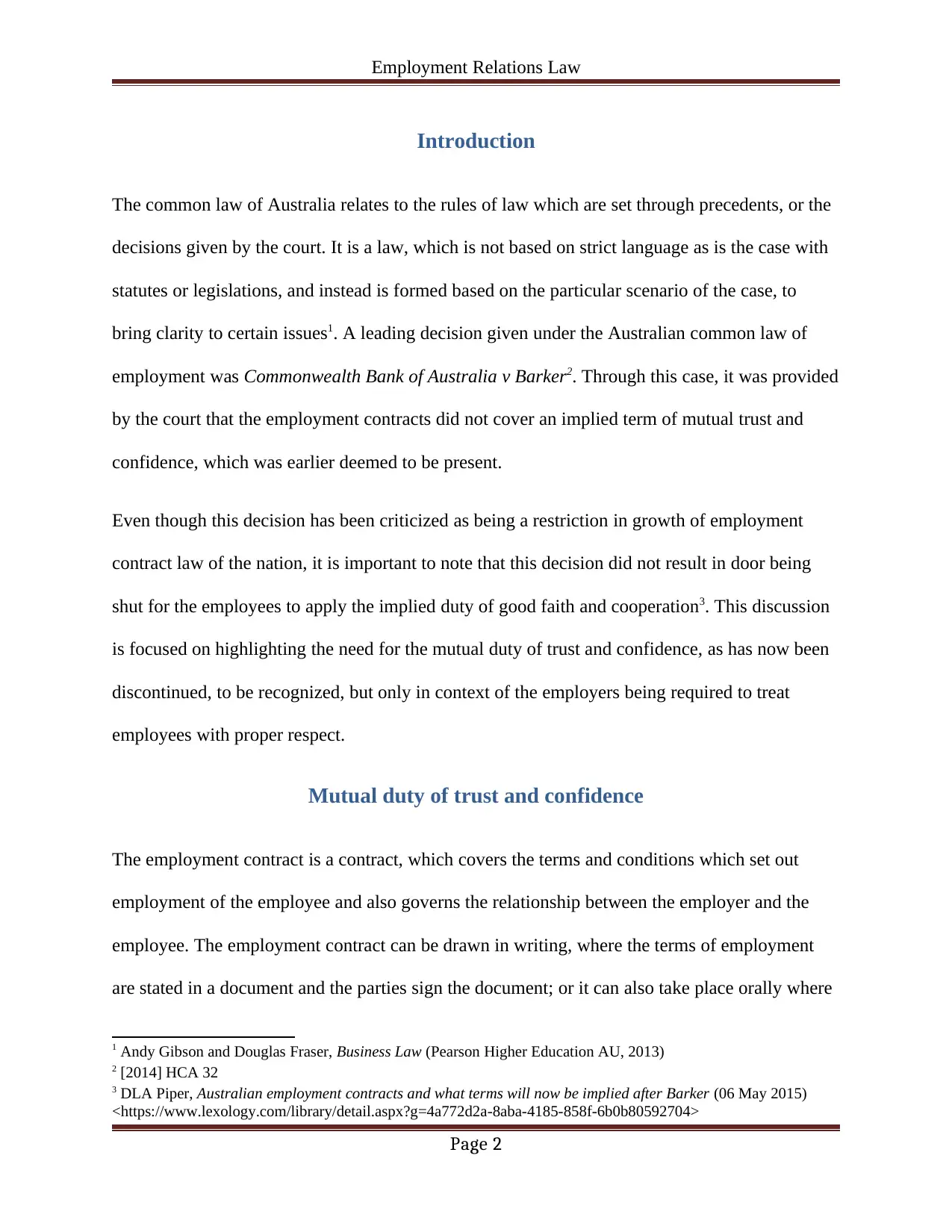
Employment Relations Law
Introduction
The common law of Australia relates to the rules of law which are set through precedents, or the
decisions given by the court. It is a law, which is not based on strict language as is the case with
statutes or legislations, and instead is formed based on the particular scenario of the case, to
bring clarity to certain issues1. A leading decision given under the Australian common law of
employment was Commonwealth Bank of Australia v Barker2. Through this case, it was provided
by the court that the employment contracts did not cover an implied term of mutual trust and
confidence, which was earlier deemed to be present.
Even though this decision has been criticized as being a restriction in growth of employment
contract law of the nation, it is important to note that this decision did not result in door being
shut for the employees to apply the implied duty of good faith and cooperation3. This discussion
is focused on highlighting the need for the mutual duty of trust and confidence, as has now been
discontinued, to be recognized, but only in context of the employers being required to treat
employees with proper respect.
Mutual duty of trust and confidence
The employment contract is a contract, which covers the terms and conditions which set out
employment of the employee and also governs the relationship between the employer and the
employee. The employment contract can be drawn in writing, where the terms of employment
are stated in a document and the parties sign the document; or it can also take place orally where
1 Andy Gibson and Douglas Fraser, Business Law (Pearson Higher Education AU, 2013)
2 [2014] HCA 32
3 DLA Piper, Australian employment contracts and what terms will now be implied after Barker (06 May 2015)
<https://www.lexology.com/library/detail.aspx?g=4a772d2a-8aba-4185-858f-6b0b80592704>
Page 2
Introduction
The common law of Australia relates to the rules of law which are set through precedents, or the
decisions given by the court. It is a law, which is not based on strict language as is the case with
statutes or legislations, and instead is formed based on the particular scenario of the case, to
bring clarity to certain issues1. A leading decision given under the Australian common law of
employment was Commonwealth Bank of Australia v Barker2. Through this case, it was provided
by the court that the employment contracts did not cover an implied term of mutual trust and
confidence, which was earlier deemed to be present.
Even though this decision has been criticized as being a restriction in growth of employment
contract law of the nation, it is important to note that this decision did not result in door being
shut for the employees to apply the implied duty of good faith and cooperation3. This discussion
is focused on highlighting the need for the mutual duty of trust and confidence, as has now been
discontinued, to be recognized, but only in context of the employers being required to treat
employees with proper respect.
Mutual duty of trust and confidence
The employment contract is a contract, which covers the terms and conditions which set out
employment of the employee and also governs the relationship between the employer and the
employee. The employment contract can be drawn in writing, where the terms of employment
are stated in a document and the parties sign the document; or it can also take place orally where
1 Andy Gibson and Douglas Fraser, Business Law (Pearson Higher Education AU, 2013)
2 [2014] HCA 32
3 DLA Piper, Australian employment contracts and what terms will now be implied after Barker (06 May 2015)
<https://www.lexology.com/library/detail.aspx?g=4a772d2a-8aba-4185-858f-6b0b80592704>
Page 2
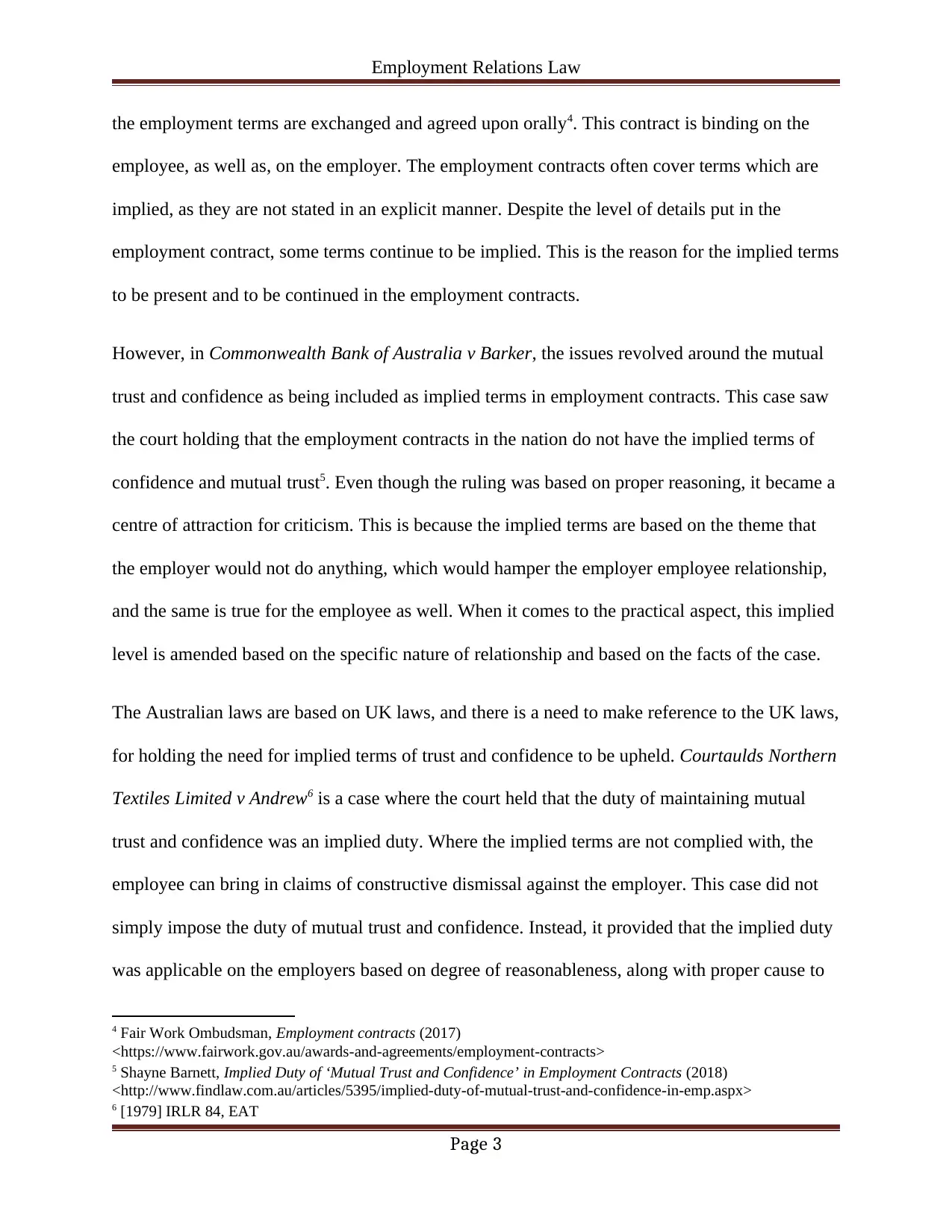
Employment Relations Law
the employment terms are exchanged and agreed upon orally4. This contract is binding on the
employee, as well as, on the employer. The employment contracts often cover terms which are
implied, as they are not stated in an explicit manner. Despite the level of details put in the
employment contract, some terms continue to be implied. This is the reason for the implied terms
to be present and to be continued in the employment contracts.
However, in Commonwealth Bank of Australia v Barker, the issues revolved around the mutual
trust and confidence as being included as implied terms in employment contracts. This case saw
the court holding that the employment contracts in the nation do not have the implied terms of
confidence and mutual trust5. Even though the ruling was based on proper reasoning, it became a
centre of attraction for criticism. This is because the implied terms are based on the theme that
the employer would not do anything, which would hamper the employer employee relationship,
and the same is true for the employee as well. When it comes to the practical aspect, this implied
level is amended based on the specific nature of relationship and based on the facts of the case.
The Australian laws are based on UK laws, and there is a need to make reference to the UK laws,
for holding the need for implied terms of trust and confidence to be upheld. Courtaulds Northern
Textiles Limited v Andrew6 is a case where the court held that the duty of maintaining mutual
trust and confidence was an implied duty. Where the implied terms are not complied with, the
employee can bring in claims of constructive dismissal against the employer. This case did not
simply impose the duty of mutual trust and confidence. Instead, it provided that the implied duty
was applicable on the employers based on degree of reasonableness, along with proper cause to
4 Fair Work Ombudsman, Employment contracts (2017)
<https://www.fairwork.gov.au/awards-and-agreements/employment-contracts>
5 Shayne Barnett, Implied Duty of ‘Mutual Trust and Confidence’ in Employment Contracts (2018)
<http://www.findlaw.com.au/articles/5395/implied-duty-of-mutual-trust-and-confidence-in-emp.aspx>
6 [1979] IRLR 84, EAT
Page 3
the employment terms are exchanged and agreed upon orally4. This contract is binding on the
employee, as well as, on the employer. The employment contracts often cover terms which are
implied, as they are not stated in an explicit manner. Despite the level of details put in the
employment contract, some terms continue to be implied. This is the reason for the implied terms
to be present and to be continued in the employment contracts.
However, in Commonwealth Bank of Australia v Barker, the issues revolved around the mutual
trust and confidence as being included as implied terms in employment contracts. This case saw
the court holding that the employment contracts in the nation do not have the implied terms of
confidence and mutual trust5. Even though the ruling was based on proper reasoning, it became a
centre of attraction for criticism. This is because the implied terms are based on the theme that
the employer would not do anything, which would hamper the employer employee relationship,
and the same is true for the employee as well. When it comes to the practical aspect, this implied
level is amended based on the specific nature of relationship and based on the facts of the case.
The Australian laws are based on UK laws, and there is a need to make reference to the UK laws,
for holding the need for implied terms of trust and confidence to be upheld. Courtaulds Northern
Textiles Limited v Andrew6 is a case where the court held that the duty of maintaining mutual
trust and confidence was an implied duty. Where the implied terms are not complied with, the
employee can bring in claims of constructive dismissal against the employer. This case did not
simply impose the duty of mutual trust and confidence. Instead, it provided that the implied duty
was applicable on the employers based on degree of reasonableness, along with proper cause to
4 Fair Work Ombudsman, Employment contracts (2017)
<https://www.fairwork.gov.au/awards-and-agreements/employment-contracts>
5 Shayne Barnett, Implied Duty of ‘Mutual Trust and Confidence’ in Employment Contracts (2018)
<http://www.findlaw.com.au/articles/5395/implied-duty-of-mutual-trust-and-confidence-in-emp.aspx>
6 [1979] IRLR 84, EAT
Page 3
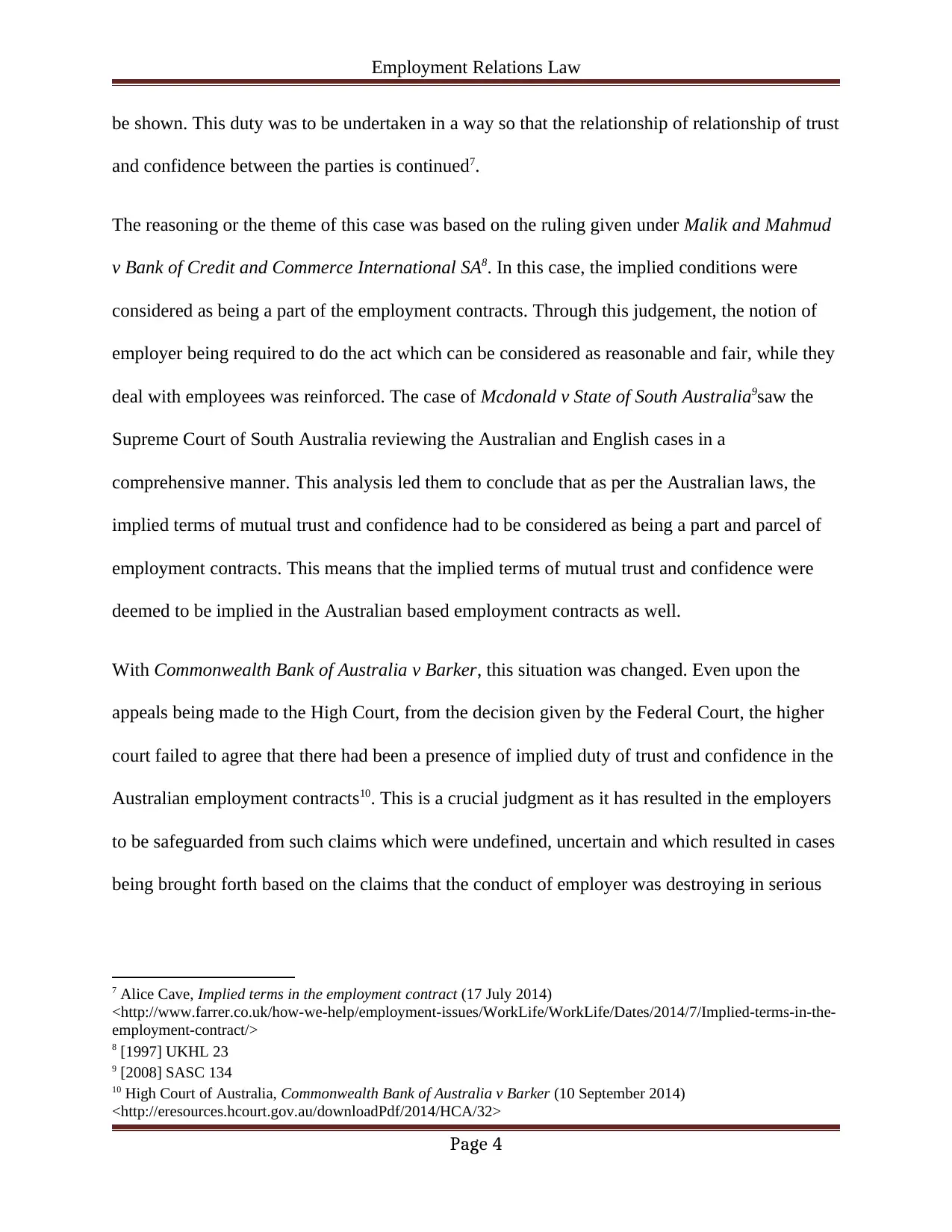
Employment Relations Law
be shown. This duty was to be undertaken in a way so that the relationship of relationship of trust
and confidence between the parties is continued7.
The reasoning or the theme of this case was based on the ruling given under Malik and Mahmud
v Bank of Credit and Commerce International SA8. In this case, the implied conditions were
considered as being a part of the employment contracts. Through this judgement, the notion of
employer being required to do the act which can be considered as reasonable and fair, while they
deal with employees was reinforced. The case of Mcdonald v State of South Australia9saw the
Supreme Court of South Australia reviewing the Australian and English cases in a
comprehensive manner. This analysis led them to conclude that as per the Australian laws, the
implied terms of mutual trust and confidence had to be considered as being a part and parcel of
employment contracts. This means that the implied terms of mutual trust and confidence were
deemed to be implied in the Australian based employment contracts as well.
With Commonwealth Bank of Australia v Barker, this situation was changed. Even upon the
appeals being made to the High Court, from the decision given by the Federal Court, the higher
court failed to agree that there had been a presence of implied duty of trust and confidence in the
Australian employment contracts10. This is a crucial judgment as it has resulted in the employers
to be safeguarded from such claims which were undefined, uncertain and which resulted in cases
being brought forth based on the claims that the conduct of employer was destroying in serious
7 Alice Cave, Implied terms in the employment contract (17 July 2014)
<http://www.farrer.co.uk/how-we-help/employment-issues/WorkLife/WorkLife/Dates/2014/7/Implied-terms-in-the-
employment-contract/>
8 [1997] UKHL 23
9 [2008] SASC 134
10 High Court of Australia, Commonwealth Bank of Australia v Barker (10 September 2014)
<http://eresources.hcourt.gov.au/downloadPdf/2014/HCA/32>
Page 4
be shown. This duty was to be undertaken in a way so that the relationship of relationship of trust
and confidence between the parties is continued7.
The reasoning or the theme of this case was based on the ruling given under Malik and Mahmud
v Bank of Credit and Commerce International SA8. In this case, the implied conditions were
considered as being a part of the employment contracts. Through this judgement, the notion of
employer being required to do the act which can be considered as reasonable and fair, while they
deal with employees was reinforced. The case of Mcdonald v State of South Australia9saw the
Supreme Court of South Australia reviewing the Australian and English cases in a
comprehensive manner. This analysis led them to conclude that as per the Australian laws, the
implied terms of mutual trust and confidence had to be considered as being a part and parcel of
employment contracts. This means that the implied terms of mutual trust and confidence were
deemed to be implied in the Australian based employment contracts as well.
With Commonwealth Bank of Australia v Barker, this situation was changed. Even upon the
appeals being made to the High Court, from the decision given by the Federal Court, the higher
court failed to agree that there had been a presence of implied duty of trust and confidence in the
Australian employment contracts10. This is a crucial judgment as it has resulted in the employers
to be safeguarded from such claims which were undefined, uncertain and which resulted in cases
being brought forth based on the claims that the conduct of employer was destroying in serious
7 Alice Cave, Implied terms in the employment contract (17 July 2014)
<http://www.farrer.co.uk/how-we-help/employment-issues/WorkLife/WorkLife/Dates/2014/7/Implied-terms-in-the-
employment-contract/>
8 [1997] UKHL 23
9 [2008] SASC 134
10 High Court of Australia, Commonwealth Bank of Australia v Barker (10 September 2014)
<http://eresources.hcourt.gov.au/downloadPdf/2014/HCA/32>
Page 4
Secure Best Marks with AI Grader
Need help grading? Try our AI Grader for instant feedback on your assignments.
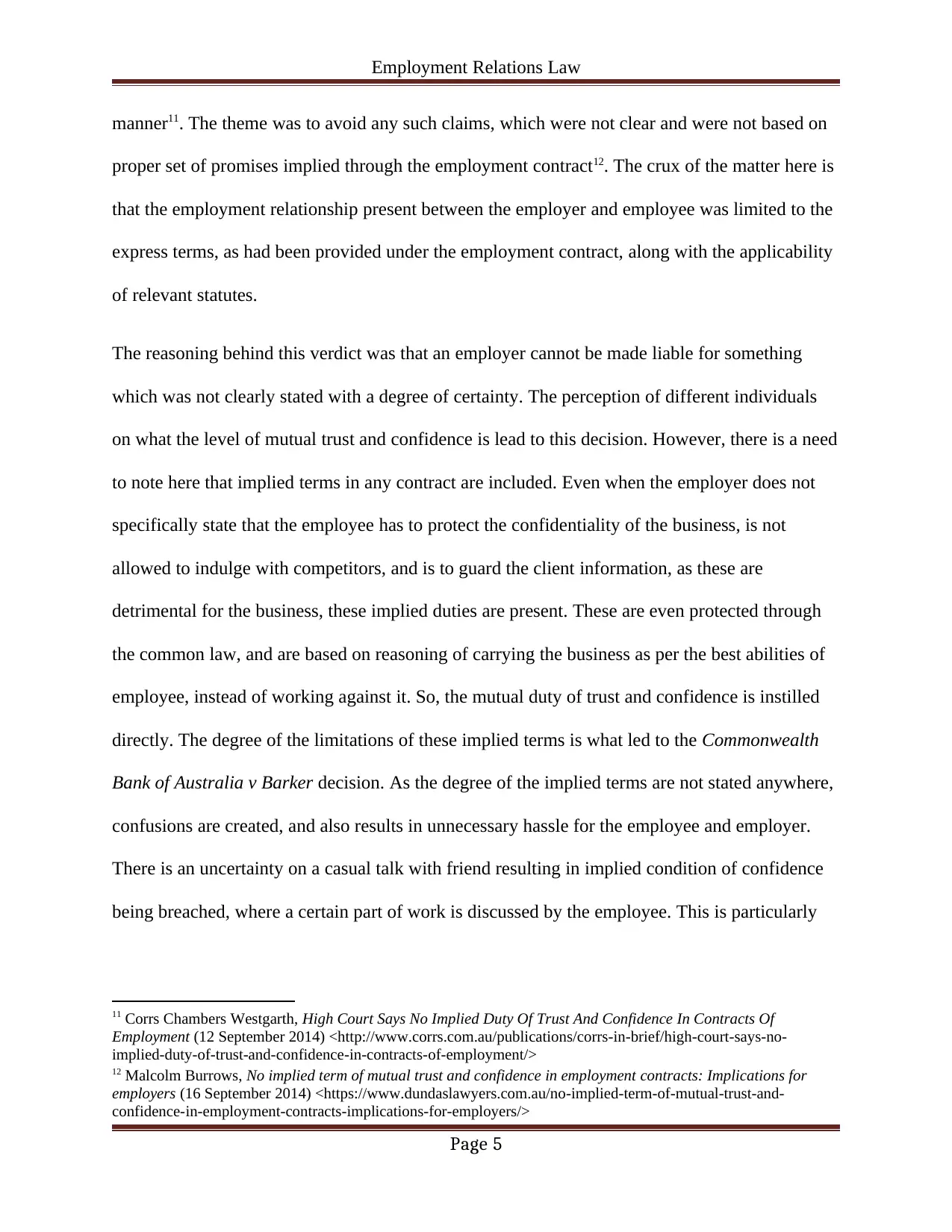
Employment Relations Law
manner11. The theme was to avoid any such claims, which were not clear and were not based on
proper set of promises implied through the employment contract12. The crux of the matter here is
that the employment relationship present between the employer and employee was limited to the
express terms, as had been provided under the employment contract, along with the applicability
of relevant statutes.
The reasoning behind this verdict was that an employer cannot be made liable for something
which was not clearly stated with a degree of certainty. The perception of different individuals
on what the level of mutual trust and confidence is lead to this decision. However, there is a need
to note here that implied terms in any contract are included. Even when the employer does not
specifically state that the employee has to protect the confidentiality of the business, is not
allowed to indulge with competitors, and is to guard the client information, as these are
detrimental for the business, these implied duties are present. These are even protected through
the common law, and are based on reasoning of carrying the business as per the best abilities of
employee, instead of working against it. So, the mutual duty of trust and confidence is instilled
directly. The degree of the limitations of these implied terms is what led to the Commonwealth
Bank of Australia v Barker decision. As the degree of the implied terms are not stated anywhere,
confusions are created, and also results in unnecessary hassle for the employee and employer.
There is an uncertainty on a casual talk with friend resulting in implied condition of confidence
being breached, where a certain part of work is discussed by the employee. This is particularly
11 Corrs Chambers Westgarth, High Court Says No Implied Duty Of Trust And Confidence In Contracts Of
Employment (12 September 2014) <http://www.corrs.com.au/publications/corrs-in-brief/high-court-says-no-
implied-duty-of-trust-and-confidence-in-contracts-of-employment/>
12 Malcolm Burrows, No implied term of mutual trust and confidence in employment contracts: Implications for
employers (16 September 2014) <https://www.dundaslawyers.com.au/no-implied-term-of-mutual-trust-and-
confidence-in-employment-contracts-implications-for-employers/>
Page 5
manner11. The theme was to avoid any such claims, which were not clear and were not based on
proper set of promises implied through the employment contract12. The crux of the matter here is
that the employment relationship present between the employer and employee was limited to the
express terms, as had been provided under the employment contract, along with the applicability
of relevant statutes.
The reasoning behind this verdict was that an employer cannot be made liable for something
which was not clearly stated with a degree of certainty. The perception of different individuals
on what the level of mutual trust and confidence is lead to this decision. However, there is a need
to note here that implied terms in any contract are included. Even when the employer does not
specifically state that the employee has to protect the confidentiality of the business, is not
allowed to indulge with competitors, and is to guard the client information, as these are
detrimental for the business, these implied duties are present. These are even protected through
the common law, and are based on reasoning of carrying the business as per the best abilities of
employee, instead of working against it. So, the mutual duty of trust and confidence is instilled
directly. The degree of the limitations of these implied terms is what led to the Commonwealth
Bank of Australia v Barker decision. As the degree of the implied terms are not stated anywhere,
confusions are created, and also results in unnecessary hassle for the employee and employer.
There is an uncertainty on a casual talk with friend resulting in implied condition of confidence
being breached, where a certain part of work is discussed by the employee. This is particularly
11 Corrs Chambers Westgarth, High Court Says No Implied Duty Of Trust And Confidence In Contracts Of
Employment (12 September 2014) <http://www.corrs.com.au/publications/corrs-in-brief/high-court-says-no-
implied-duty-of-trust-and-confidence-in-contracts-of-employment/>
12 Malcolm Burrows, No implied term of mutual trust and confidence in employment contracts: Implications for
employers (16 September 2014) <https://www.dundaslawyers.com.au/no-implied-term-of-mutual-trust-and-
confidence-in-employment-contracts-implications-for-employers/>
Page 5
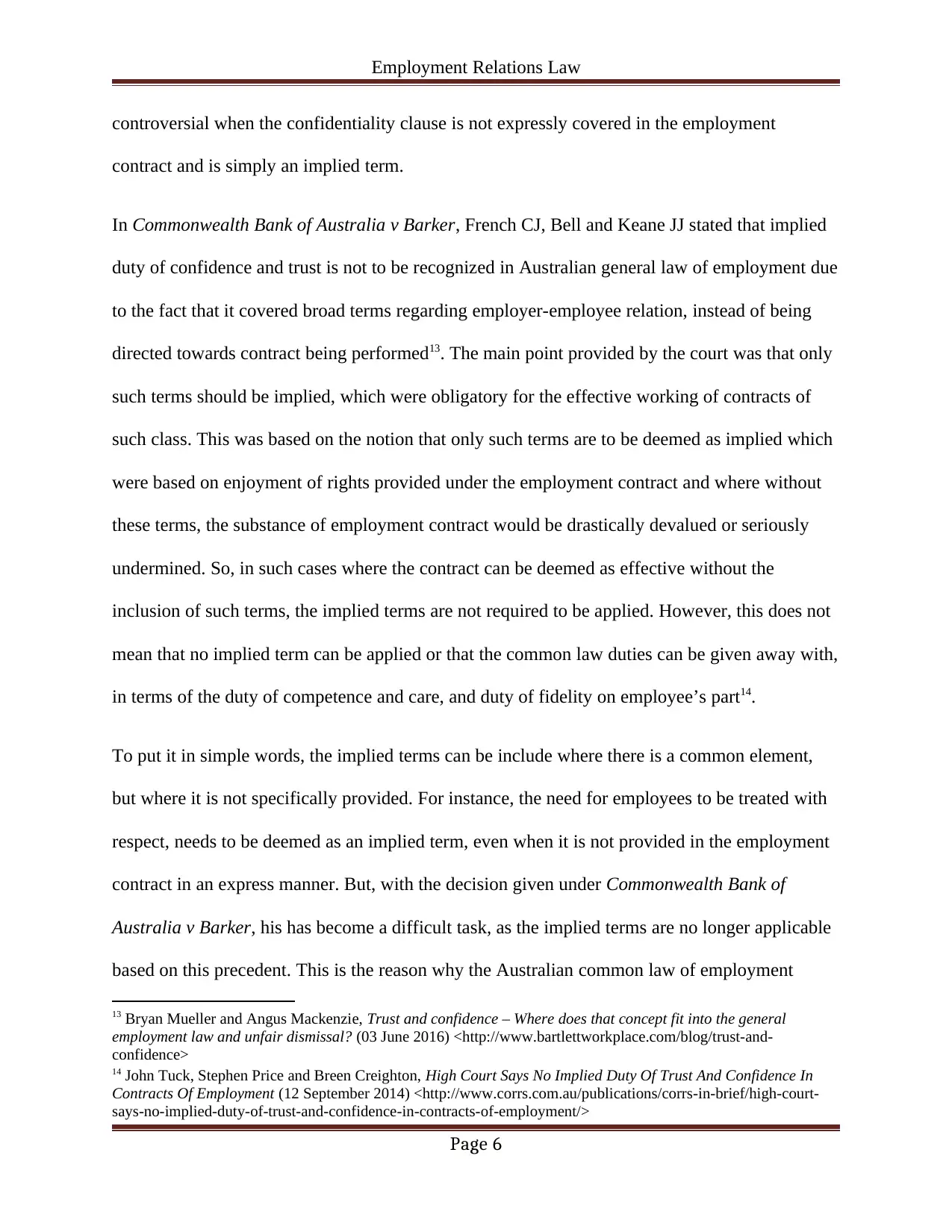
Employment Relations Law
controversial when the confidentiality clause is not expressly covered in the employment
contract and is simply an implied term.
In Commonwealth Bank of Australia v Barker, French CJ, Bell and Keane JJ stated that implied
duty of confidence and trust is not to be recognized in Australian general law of employment due
to the fact that it covered broad terms regarding employer-employee relation, instead of being
directed towards contract being performed13. The main point provided by the court was that only
such terms should be implied, which were obligatory for the effective working of contracts of
such class. This was based on the notion that only such terms are to be deemed as implied which
were based on enjoyment of rights provided under the employment contract and where without
these terms, the substance of employment contract would be drastically devalued or seriously
undermined. So, in such cases where the contract can be deemed as effective without the
inclusion of such terms, the implied terms are not required to be applied. However, this does not
mean that no implied term can be applied or that the common law duties can be given away with,
in terms of the duty of competence and care, and duty of fidelity on employee’s part14.
To put it in simple words, the implied terms can be include where there is a common element,
but where it is not specifically provided. For instance, the need for employees to be treated with
respect, needs to be deemed as an implied term, even when it is not provided in the employment
contract in an express manner. But, with the decision given under Commonwealth Bank of
Australia v Barker, his has become a difficult task, as the implied terms are no longer applicable
based on this precedent. This is the reason why the Australian common law of employment
13 Bryan Mueller and Angus Mackenzie, Trust and confidence – Where does that concept fit into the general
employment law and unfair dismissal? (03 June 2016) <http://www.bartlettworkplace.com/blog/trust-and-
confidence>
14 John Tuck, Stephen Price and Breen Creighton, High Court Says No Implied Duty Of Trust And Confidence In
Contracts Of Employment (12 September 2014) <http://www.corrs.com.au/publications/corrs-in-brief/high-court-
says-no-implied-duty-of-trust-and-confidence-in-contracts-of-employment/>
Page 6
controversial when the confidentiality clause is not expressly covered in the employment
contract and is simply an implied term.
In Commonwealth Bank of Australia v Barker, French CJ, Bell and Keane JJ stated that implied
duty of confidence and trust is not to be recognized in Australian general law of employment due
to the fact that it covered broad terms regarding employer-employee relation, instead of being
directed towards contract being performed13. The main point provided by the court was that only
such terms should be implied, which were obligatory for the effective working of contracts of
such class. This was based on the notion that only such terms are to be deemed as implied which
were based on enjoyment of rights provided under the employment contract and where without
these terms, the substance of employment contract would be drastically devalued or seriously
undermined. So, in such cases where the contract can be deemed as effective without the
inclusion of such terms, the implied terms are not required to be applied. However, this does not
mean that no implied term can be applied or that the common law duties can be given away with,
in terms of the duty of competence and care, and duty of fidelity on employee’s part14.
To put it in simple words, the implied terms can be include where there is a common element,
but where it is not specifically provided. For instance, the need for employees to be treated with
respect, needs to be deemed as an implied term, even when it is not provided in the employment
contract in an express manner. But, with the decision given under Commonwealth Bank of
Australia v Barker, his has become a difficult task, as the implied terms are no longer applicable
based on this precedent. This is the reason why the Australian common law of employment
13 Bryan Mueller and Angus Mackenzie, Trust and confidence – Where does that concept fit into the general
employment law and unfair dismissal? (03 June 2016) <http://www.bartlettworkplace.com/blog/trust-and-
confidence>
14 John Tuck, Stephen Price and Breen Creighton, High Court Says No Implied Duty Of Trust And Confidence In
Contracts Of Employment (12 September 2014) <http://www.corrs.com.au/publications/corrs-in-brief/high-court-
says-no-implied-duty-of-trust-and-confidence-in-contracts-of-employment/>
Page 6
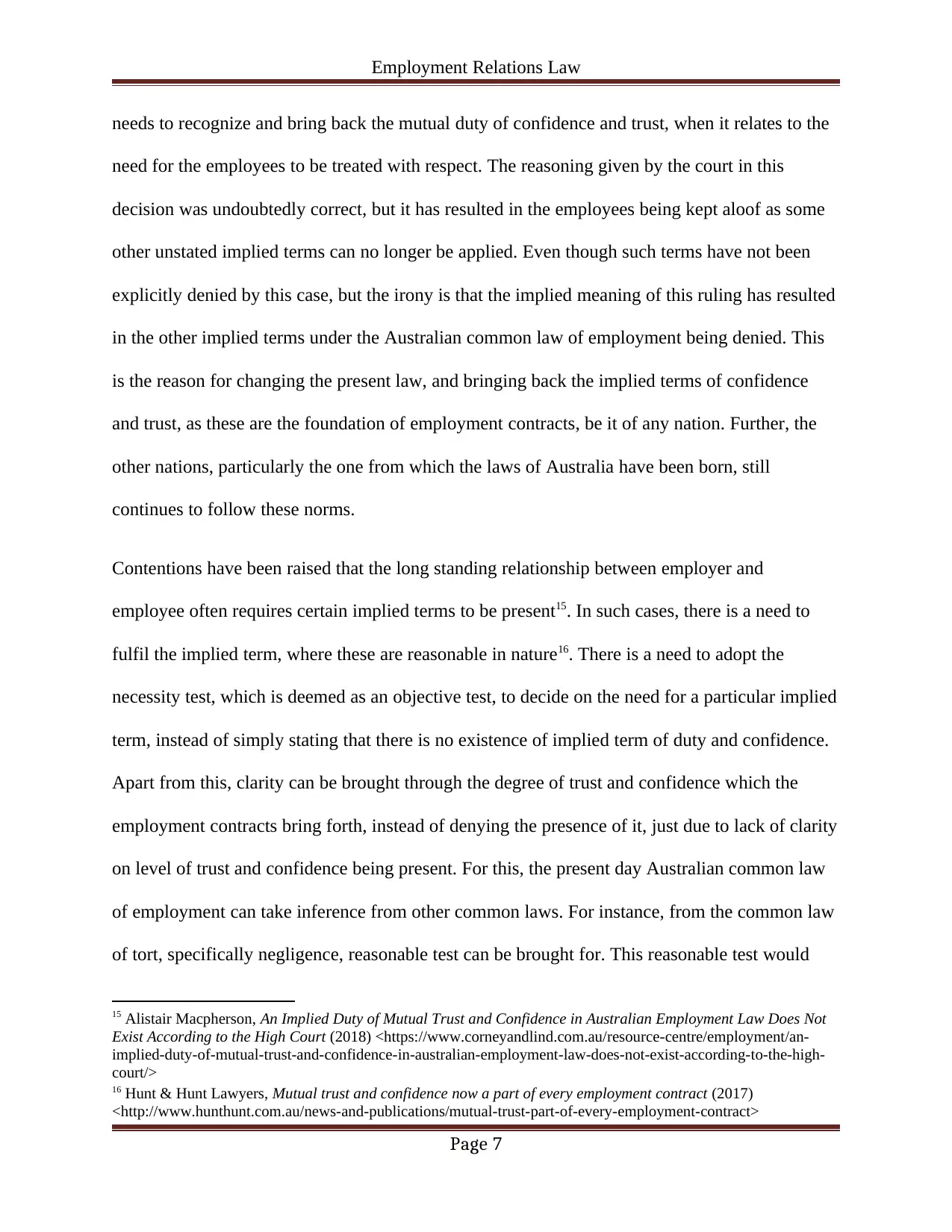
Employment Relations Law
needs to recognize and bring back the mutual duty of confidence and trust, when it relates to the
need for the employees to be treated with respect. The reasoning given by the court in this
decision was undoubtedly correct, but it has resulted in the employees being kept aloof as some
other unstated implied terms can no longer be applied. Even though such terms have not been
explicitly denied by this case, but the irony is that the implied meaning of this ruling has resulted
in the other implied terms under the Australian common law of employment being denied. This
is the reason for changing the present law, and bringing back the implied terms of confidence
and trust, as these are the foundation of employment contracts, be it of any nation. Further, the
other nations, particularly the one from which the laws of Australia have been born, still
continues to follow these norms.
Contentions have been raised that the long standing relationship between employer and
employee often requires certain implied terms to be present15. In such cases, there is a need to
fulfil the implied term, where these are reasonable in nature16. There is a need to adopt the
necessity test, which is deemed as an objective test, to decide on the need for a particular implied
term, instead of simply stating that there is no existence of implied term of duty and confidence.
Apart from this, clarity can be brought through the degree of trust and confidence which the
employment contracts bring forth, instead of denying the presence of it, just due to lack of clarity
on level of trust and confidence being present. For this, the present day Australian common law
of employment can take inference from other common laws. For instance, from the common law
of tort, specifically negligence, reasonable test can be brought for. This reasonable test would
15 Alistair Macpherson, An Implied Duty of Mutual Trust and Confidence in Australian Employment Law Does Not
Exist According to the High Court (2018) <https://www.corneyandlind.com.au/resource-centre/employment/an-
implied-duty-of-mutual-trust-and-confidence-in-australian-employment-law-does-not-exist-according-to-the-high-
court/>
16 Hunt & Hunt Lawyers, Mutual trust and confidence now a part of every employment contract (2017)
<http://www.hunthunt.com.au/news-and-publications/mutual-trust-part-of-every-employment-contract>
Page 7
needs to recognize and bring back the mutual duty of confidence and trust, when it relates to the
need for the employees to be treated with respect. The reasoning given by the court in this
decision was undoubtedly correct, but it has resulted in the employees being kept aloof as some
other unstated implied terms can no longer be applied. Even though such terms have not been
explicitly denied by this case, but the irony is that the implied meaning of this ruling has resulted
in the other implied terms under the Australian common law of employment being denied. This
is the reason for changing the present law, and bringing back the implied terms of confidence
and trust, as these are the foundation of employment contracts, be it of any nation. Further, the
other nations, particularly the one from which the laws of Australia have been born, still
continues to follow these norms.
Contentions have been raised that the long standing relationship between employer and
employee often requires certain implied terms to be present15. In such cases, there is a need to
fulfil the implied term, where these are reasonable in nature16. There is a need to adopt the
necessity test, which is deemed as an objective test, to decide on the need for a particular implied
term, instead of simply stating that there is no existence of implied term of duty and confidence.
Apart from this, clarity can be brought through the degree of trust and confidence which the
employment contracts bring forth, instead of denying the presence of it, just due to lack of clarity
on level of trust and confidence being present. For this, the present day Australian common law
of employment can take inference from other common laws. For instance, from the common law
of tort, specifically negligence, reasonable test can be brought for. This reasonable test would
15 Alistair Macpherson, An Implied Duty of Mutual Trust and Confidence in Australian Employment Law Does Not
Exist According to the High Court (2018) <https://www.corneyandlind.com.au/resource-centre/employment/an-
implied-duty-of-mutual-trust-and-confidence-in-australian-employment-law-does-not-exist-according-to-the-high-
court/>
16 Hunt & Hunt Lawyers, Mutual trust and confidence now a part of every employment contract (2017)
<http://www.hunthunt.com.au/news-and-publications/mutual-trust-part-of-every-employment-contract>
Page 7
Paraphrase This Document
Need a fresh take? Get an instant paraphrase of this document with our AI Paraphraser
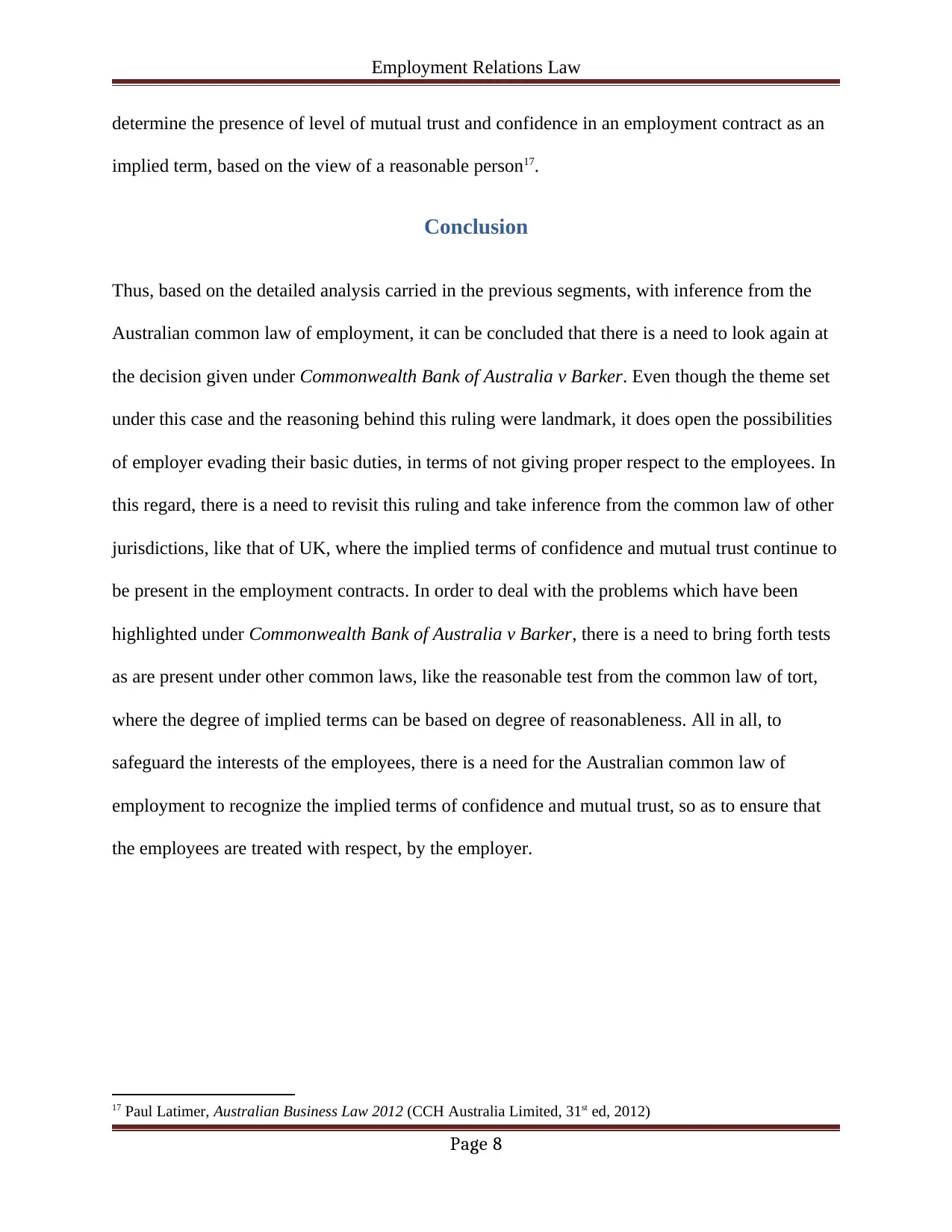
Employment Relations Law
determine the presence of level of mutual trust and confidence in an employment contract as an
implied term, based on the view of a reasonable person17.
Conclusion
Thus, based on the detailed analysis carried in the previous segments, with inference from the
Australian common law of employment, it can be concluded that there is a need to look again at
the decision given under Commonwealth Bank of Australia v Barker. Even though the theme set
under this case and the reasoning behind this ruling were landmark, it does open the possibilities
of employer evading their basic duties, in terms of not giving proper respect to the employees. In
this regard, there is a need to revisit this ruling and take inference from the common law of other
jurisdictions, like that of UK, where the implied terms of confidence and mutual trust continue to
be present in the employment contracts. In order to deal with the problems which have been
highlighted under Commonwealth Bank of Australia v Barker, there is a need to bring forth tests
as are present under other common laws, like the reasonable test from the common law of tort,
where the degree of implied terms can be based on degree of reasonableness. All in all, to
safeguard the interests of the employees, there is a need for the Australian common law of
employment to recognize the implied terms of confidence and mutual trust, so as to ensure that
the employees are treated with respect, by the employer.
17 Paul Latimer, Australian Business Law 2012 (CCH Australia Limited, 31st ed, 2012)
Page 8
determine the presence of level of mutual trust and confidence in an employment contract as an
implied term, based on the view of a reasonable person17.
Conclusion
Thus, based on the detailed analysis carried in the previous segments, with inference from the
Australian common law of employment, it can be concluded that there is a need to look again at
the decision given under Commonwealth Bank of Australia v Barker. Even though the theme set
under this case and the reasoning behind this ruling were landmark, it does open the possibilities
of employer evading their basic duties, in terms of not giving proper respect to the employees. In
this regard, there is a need to revisit this ruling and take inference from the common law of other
jurisdictions, like that of UK, where the implied terms of confidence and mutual trust continue to
be present in the employment contracts. In order to deal with the problems which have been
highlighted under Commonwealth Bank of Australia v Barker, there is a need to bring forth tests
as are present under other common laws, like the reasonable test from the common law of tort,
where the degree of implied terms can be based on degree of reasonableness. All in all, to
safeguard the interests of the employees, there is a need for the Australian common law of
employment to recognize the implied terms of confidence and mutual trust, so as to ensure that
the employees are treated with respect, by the employer.
17 Paul Latimer, Australian Business Law 2012 (CCH Australia Limited, 31st ed, 2012)
Page 8
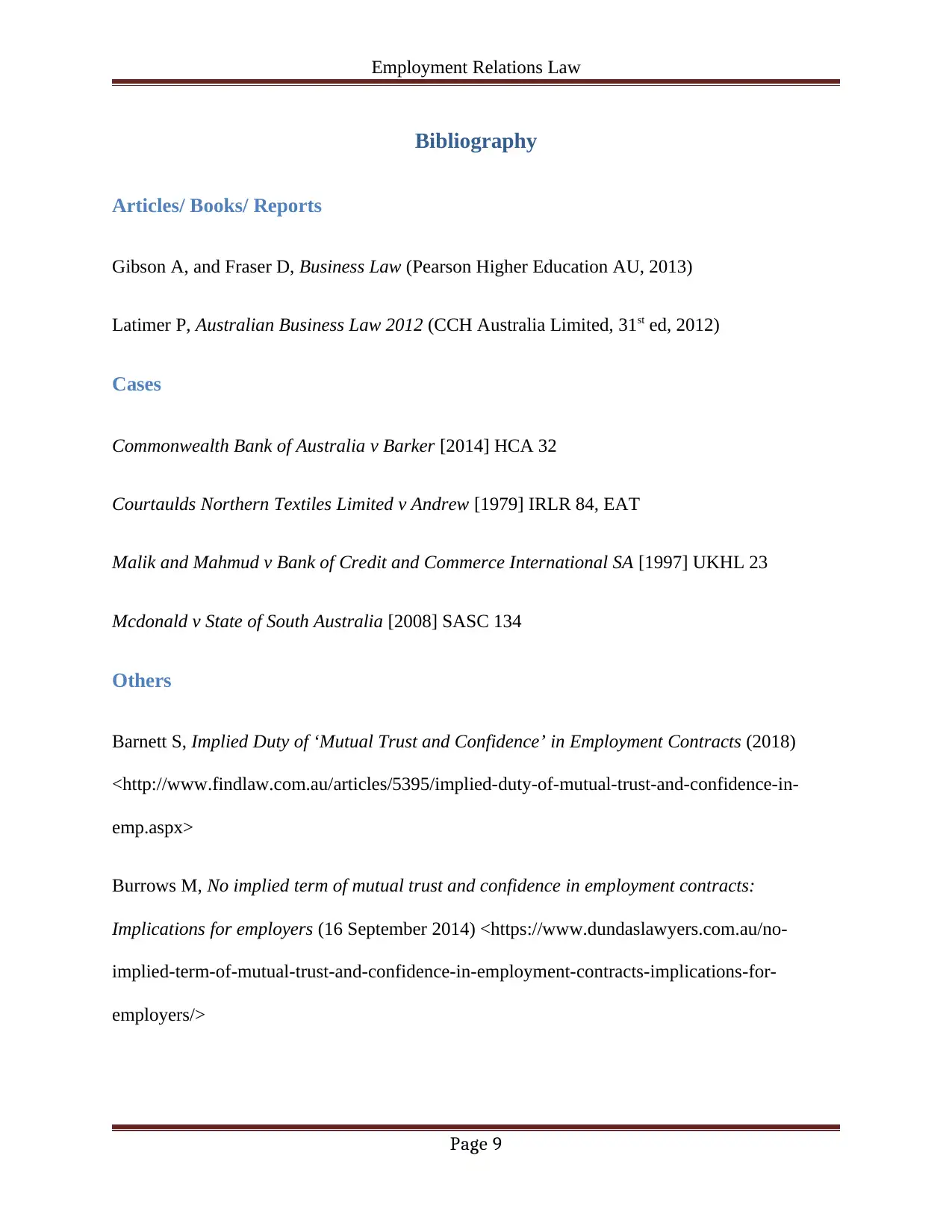
Employment Relations Law
Bibliography
Articles/ Books/ Reports
Gibson A, and Fraser D, Business Law (Pearson Higher Education AU, 2013)
Latimer P, Australian Business Law 2012 (CCH Australia Limited, 31st ed, 2012)
Cases
Commonwealth Bank of Australia v Barker [2014] HCA 32
Courtaulds Northern Textiles Limited v Andrew [1979] IRLR 84, EAT
Malik and Mahmud v Bank of Credit and Commerce International SA [1997] UKHL 23
Mcdonald v State of South Australia [2008] SASC 134
Others
Barnett S, Implied Duty of ‘Mutual Trust and Confidence’ in Employment Contracts (2018)
<http://www.findlaw.com.au/articles/5395/implied-duty-of-mutual-trust-and-confidence-in-
emp.aspx>
Burrows M, No implied term of mutual trust and confidence in employment contracts:
Implications for employers (16 September 2014) <https://www.dundaslawyers.com.au/no-
implied-term-of-mutual-trust-and-confidence-in-employment-contracts-implications-for-
employers/>
Page 9
Bibliography
Articles/ Books/ Reports
Gibson A, and Fraser D, Business Law (Pearson Higher Education AU, 2013)
Latimer P, Australian Business Law 2012 (CCH Australia Limited, 31st ed, 2012)
Cases
Commonwealth Bank of Australia v Barker [2014] HCA 32
Courtaulds Northern Textiles Limited v Andrew [1979] IRLR 84, EAT
Malik and Mahmud v Bank of Credit and Commerce International SA [1997] UKHL 23
Mcdonald v State of South Australia [2008] SASC 134
Others
Barnett S, Implied Duty of ‘Mutual Trust and Confidence’ in Employment Contracts (2018)
<http://www.findlaw.com.au/articles/5395/implied-duty-of-mutual-trust-and-confidence-in-
emp.aspx>
Burrows M, No implied term of mutual trust and confidence in employment contracts:
Implications for employers (16 September 2014) <https://www.dundaslawyers.com.au/no-
implied-term-of-mutual-trust-and-confidence-in-employment-contracts-implications-for-
employers/>
Page 9
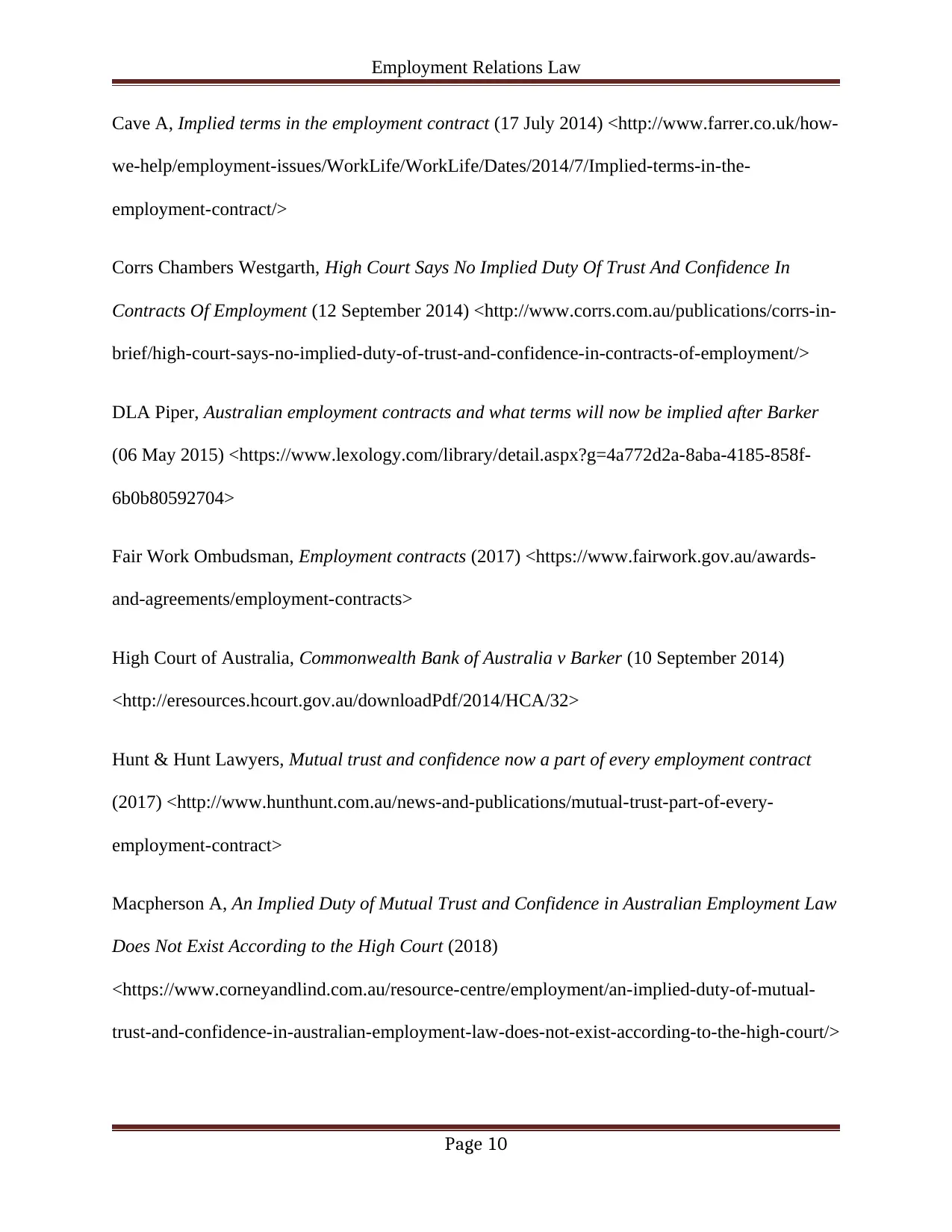
Employment Relations Law
Cave A, Implied terms in the employment contract (17 July 2014) <http://www.farrer.co.uk/how-
we-help/employment-issues/WorkLife/WorkLife/Dates/2014/7/Implied-terms-in-the-
employment-contract/>
Corrs Chambers Westgarth, High Court Says No Implied Duty Of Trust And Confidence In
Contracts Of Employment (12 September 2014) <http://www.corrs.com.au/publications/corrs-in-
brief/high-court-says-no-implied-duty-of-trust-and-confidence-in-contracts-of-employment/>
DLA Piper, Australian employment contracts and what terms will now be implied after Barker
(06 May 2015) <https://www.lexology.com/library/detail.aspx?g=4a772d2a-8aba-4185-858f-
6b0b80592704>
Fair Work Ombudsman, Employment contracts (2017) <https://www.fairwork.gov.au/awards-
and-agreements/employment-contracts>
High Court of Australia, Commonwealth Bank of Australia v Barker (10 September 2014)
<http://eresources.hcourt.gov.au/downloadPdf/2014/HCA/32>
Hunt & Hunt Lawyers, Mutual trust and confidence now a part of every employment contract
(2017) <http://www.hunthunt.com.au/news-and-publications/mutual-trust-part-of-every-
employment-contract>
Macpherson A, An Implied Duty of Mutual Trust and Confidence in Australian Employment Law
Does Not Exist According to the High Court (2018)
<https://www.corneyandlind.com.au/resource-centre/employment/an-implied-duty-of-mutual-
trust-and-confidence-in-australian-employment-law-does-not-exist-according-to-the-high-court/>
Page 10
Cave A, Implied terms in the employment contract (17 July 2014) <http://www.farrer.co.uk/how-
we-help/employment-issues/WorkLife/WorkLife/Dates/2014/7/Implied-terms-in-the-
employment-contract/>
Corrs Chambers Westgarth, High Court Says No Implied Duty Of Trust And Confidence In
Contracts Of Employment (12 September 2014) <http://www.corrs.com.au/publications/corrs-in-
brief/high-court-says-no-implied-duty-of-trust-and-confidence-in-contracts-of-employment/>
DLA Piper, Australian employment contracts and what terms will now be implied after Barker
(06 May 2015) <https://www.lexology.com/library/detail.aspx?g=4a772d2a-8aba-4185-858f-
6b0b80592704>
Fair Work Ombudsman, Employment contracts (2017) <https://www.fairwork.gov.au/awards-
and-agreements/employment-contracts>
High Court of Australia, Commonwealth Bank of Australia v Barker (10 September 2014)
<http://eresources.hcourt.gov.au/downloadPdf/2014/HCA/32>
Hunt & Hunt Lawyers, Mutual trust and confidence now a part of every employment contract
(2017) <http://www.hunthunt.com.au/news-and-publications/mutual-trust-part-of-every-
employment-contract>
Macpherson A, An Implied Duty of Mutual Trust and Confidence in Australian Employment Law
Does Not Exist According to the High Court (2018)
<https://www.corneyandlind.com.au/resource-centre/employment/an-implied-duty-of-mutual-
trust-and-confidence-in-australian-employment-law-does-not-exist-according-to-the-high-court/>
Page 10
Secure Best Marks with AI Grader
Need help grading? Try our AI Grader for instant feedback on your assignments.
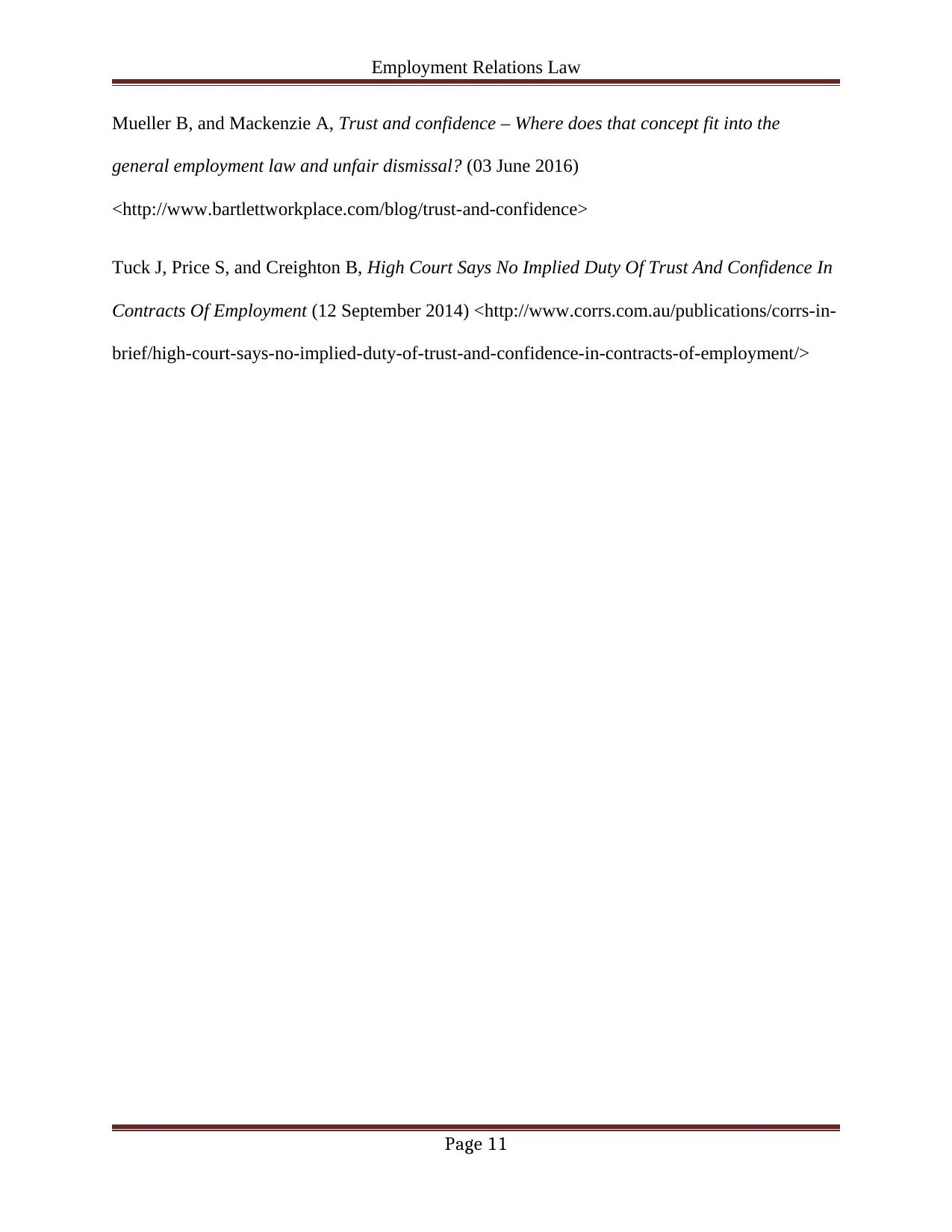
Employment Relations Law
Mueller B, and Mackenzie A, Trust and confidence – Where does that concept fit into the
general employment law and unfair dismissal? (03 June 2016)
<http://www.bartlettworkplace.com/blog/trust-and-confidence>
Tuck J, Price S, and Creighton B, High Court Says No Implied Duty Of Trust And Confidence In
Contracts Of Employment (12 September 2014) <http://www.corrs.com.au/publications/corrs-in-
brief/high-court-says-no-implied-duty-of-trust-and-confidence-in-contracts-of-employment/>
Page 11
Mueller B, and Mackenzie A, Trust and confidence – Where does that concept fit into the
general employment law and unfair dismissal? (03 June 2016)
<http://www.bartlettworkplace.com/blog/trust-and-confidence>
Tuck J, Price S, and Creighton B, High Court Says No Implied Duty Of Trust And Confidence In
Contracts Of Employment (12 September 2014) <http://www.corrs.com.au/publications/corrs-in-
brief/high-court-says-no-implied-duty-of-trust-and-confidence-in-contracts-of-employment/>
Page 11
1 out of 11
Related Documents
Your All-in-One AI-Powered Toolkit for Academic Success.
+13062052269
info@desklib.com
Available 24*7 on WhatsApp / Email
![[object Object]](/_next/static/media/star-bottom.7253800d.svg)
Unlock your academic potential
© 2024 | Zucol Services PVT LTD | All rights reserved.




